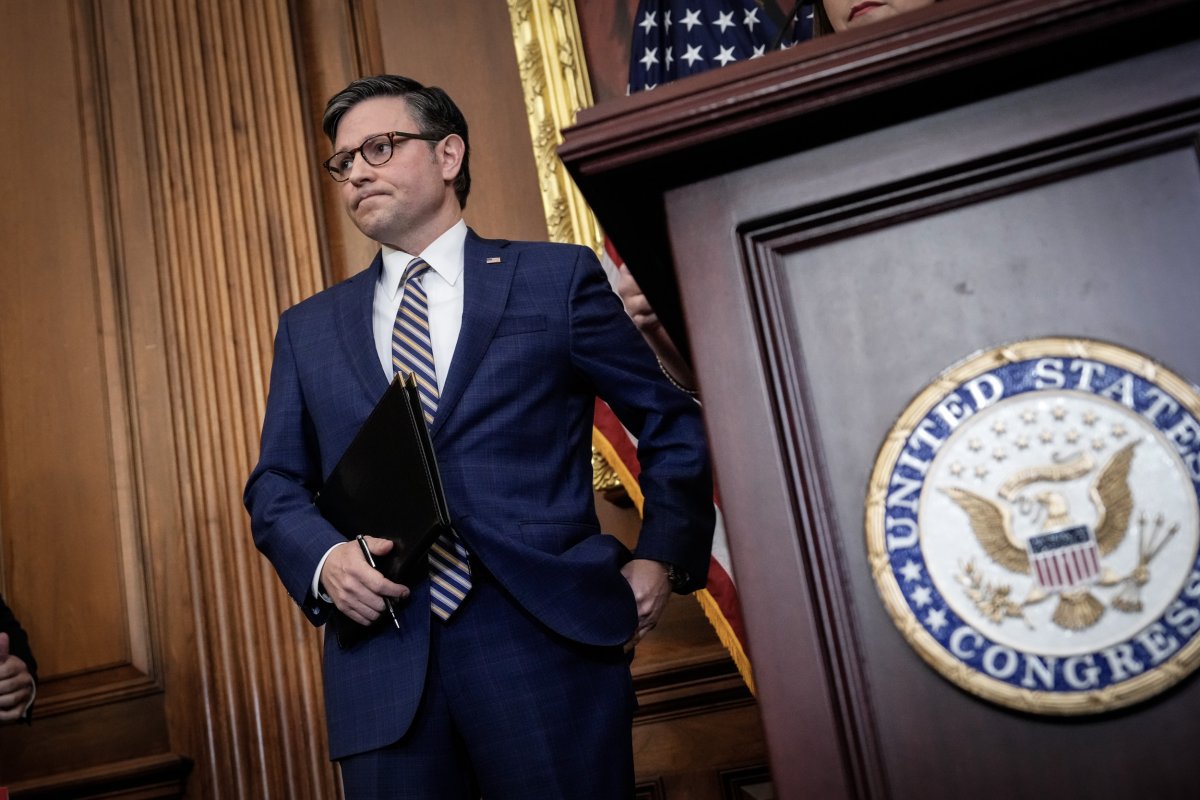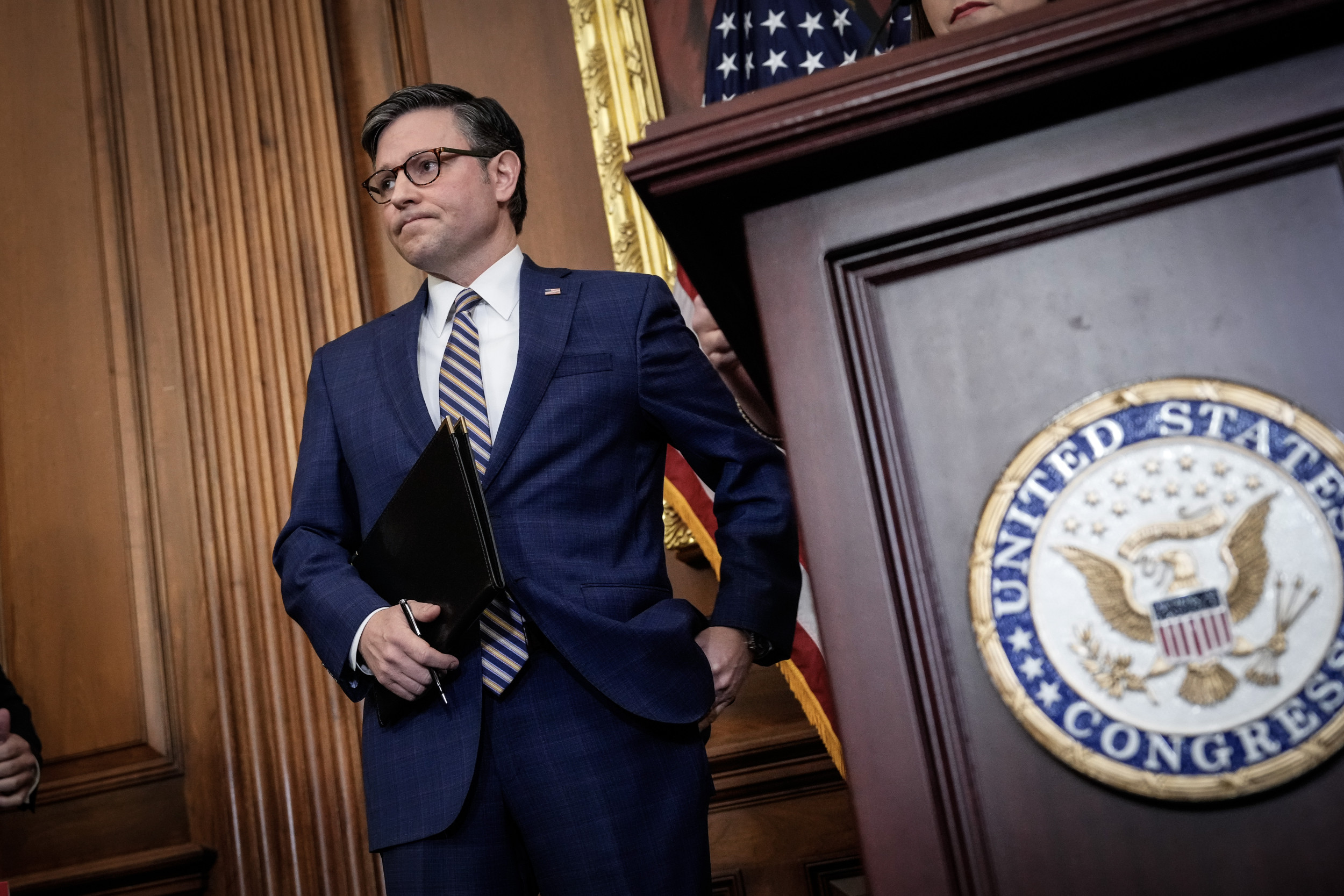House Republicans have yet to present a unified plan to address the impending November 17 government shutdown deadline despite holding a closed-door meeting Tuesday morning centered around the issue.
With the deadline just 10 days away, Speaker Mike Johnson stressed that he does not want to see the government shutdown but did not offer specifics about how his party plans to move forward when asked about the issue during an afternoon press conference.
“I’m not going to tell you when we will bring it to the floor, but it will be in time, how about that? Trust us: We’re working through the process in a way that I think that people will be proud of,” Johnson said. “[We had] very deliberate, positive discussions about the many options that are on the table, and we’ll be revealing what our plan is in short order.”
Johnson’s comments come amid uncertainty over how House Republicans will respond to the looming shutdown date. Congressman Kevin McCarthy was ousted from the speakership in October after hard right conservatives took issue with his decision to vote with Democrats on a “continuing resolution” (CR) that extended government funding beyond the then-September 30 deadline.
With the rule that allowed for McCarthy’s ousting still in place, Johnson has approached the shutdown deadline cautiously, entertaining an array of ideas on how to craft a potential CR. This included the unprecedented idea of a “laddered CR” where, instead of extending the 12 federal funding bills all at once with the same deadline, Congress would introduce staggered deadlines, prioritizing the funding of agencies with more expedient deadlines.

Photo by Drew Angerer/Getty Images
The idea, which has traction among hard right conservatives, was criticized by Democrats and some Republicans who found it confusing and impractical. Democratic Congressman Gerry Connolly of Virginia, who represents thousands of federal employees who would suffer from a shutdown, said the House GOP’s approach to a CR reflects a commitment to obstructing federal government.
“They’re going through contortions because, fundamentally, they don’t have a core commitment to the operations of government,” he told Newsweek. “This is hardly a complicated question, not a new one for Congress: ‘How do we keep the government open?’ It’s not hard.”
“It is hard if ideologically you don’t believe in the mission to begin with,” Connolly added, “and want to use it as an opportunity, a vehicle, for conditionality on one of your favorite pet subject, whatever that might be, and apparently, they have a lot of them.”
While Congress must pass 12 appropriations bills each year to keep federal agencies open, in recent decades these bills have been lumped together into larger legislative packages, streamlining the process.
However, since taking control of the House in 2023, House Republicans have prioritized voting on these spending bills one by one. The House GOP has also placed federal deficit reduction at the forefront of its priorities, which has resulted in many of these bills including deep cuts to federal agencies that most Democrats would never support.
Given the challenges the House and Democratic-controlled Senate will face reaching an agreement on these 12 future spending bills, many would like to see a continuing resolution to extend the November 17 deadline passed in a noncontroversial fashion, including Republican Senators John Neely Kennedy of Louisiana and Jerry Moran of Kansas, who serve on the Appropriations Committee.
Speaking to reporters, Kennedy said he’d be “fine with a clean CR,” which extends the shutdown deadline without adding any policy changes or introducing additional spending or cuts. While Kennedy would be open to provisions that cut spending or reduce the debt, he doesn’t see such a deal happening with the limited amount of time remaining.
Moran expressed similar thoughts, telling Newsweek he wants to see a CR move “expeditiously, timely, in a way that there’s not any delay in [avoiding] any shutdown or a weekend in which there is uncertainty.” Like Kennedy, he sees a clean CR as the most likely solution, saying there does not appear to be enough time left to introduce a CR attached with supplemental funding for Israel and Ukraine, another issue that has divided Republicans.
While brief shutdowns lasting a few days generally do not have serious consequences on the economy, the nonpartisan Brookings Institution writes that prolonged shutdowns can. During such periods, nonessential federal workers are furloughed, which can create government processing disruptions that can affect small business loans, federal benefits, passport applications, and other services. Additionally, past shutdowns have reduced the growth of America’s GDP.
Despite these potential costs and the limited time left before the deadline, America has previously seen Congress act swiftly and avoid catastrophe at the last minute, with the September 30 CR deal between McCarthy and Democrats serving as a recent example.
Senator Josh Hawley of Missouri, who has opposed federal shutdowns, wants to see what plan the House brings forth before ruling out ideas that deviate from a clean CR. He backs Johnson’s goal of passing the spending bills individually and wants to see that effort supported, even if it means Congress could take an unorthodox approach to a CR.
“We ought to be supportive of what the House is trying to do, faster appropriations bills,” Hawley told Newsweek. “Let’s see what decision they come to. I want to see what’s in the House bill. I’d like to see what their general approach is. If we can support it, then I’d like to try and support it.”
Uncommon Knowledge
Newsweek is committed to challenging conventional wisdom and finding connections in the search for common ground.
Newsweek is committed to challenging conventional wisdom and finding connections in the search for common ground.





More Stories
10 merek aksesori smartphone terbaik di tahun 2024
7 motor sport paling terkenal dan mahal di dunia
10 Hotel di singapore yang menawarkan fasilitas mewah